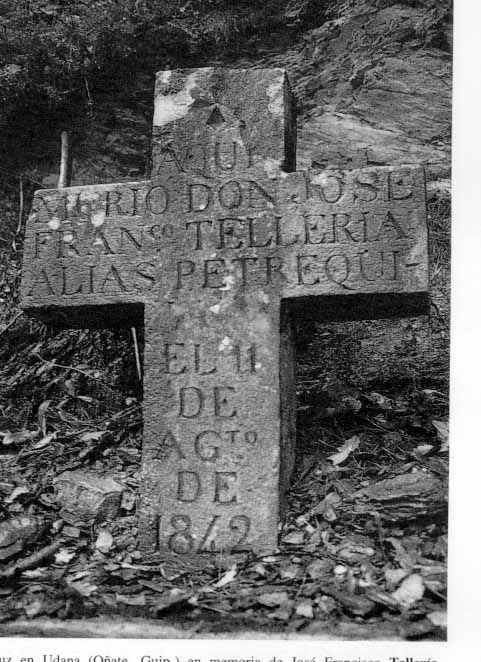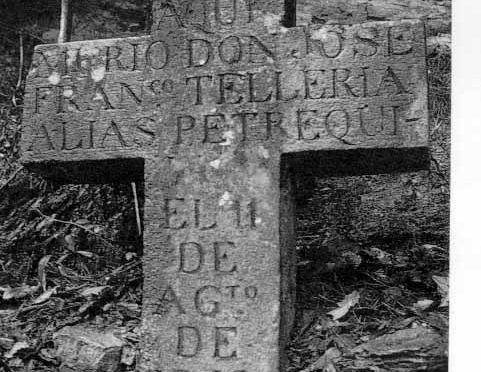There are times when someone does something so singular that their name becomes associated with the act, that their name becomes an eponym. In the United States, we sign our John Hancock. A Benedict Arnold is a traitor. And McCarthyism has taken on meaning beyond McCarthy’s original campaign against communists. Eponyms exist in other languages too, of course. In the Basque Country, there was a long line of healers that were known as Petriquillo or Petrikilo. However, because of one of these healers, Petrikilo has taken on a new meaning: a quack.

- José Francisco Tellería Uribe was born on October 1, 1774 in the small town of Zerain, in Gipuzkoa, in the Arene baserria. The baserria was owned by his father Francisco Tomás, and through helping him with the herding duties on the property, Petrikilo, a nickname inherited from his father, learned the basics of anatomy, botany, and surgery. José Francisco was actually the most famous in a dynasty of Petrikilos who had obtained fame for their healing prowess.
- During the War of Independence (the Peninsular War), in the years of 1808 and 1809, he worked for the battalions of Gaspar de Jáuregui, known as “el Pastor” or “the Shepherd.” Even though he didn’t have a license to practice medicine – and was even ordered not to – he attended the wounded soldiers and gained some fame for his abilities. It was during this time that he got to know the future military leader Tomás de Zumalacárregui.
- So many positive testimonials had been submitted on his behalf that, in 1827, he was admitted to an exam by the Royal Superior Board of Surgery. His specialty was broken bones and he was to be tested on his knowledge in this area, in the Basque language. In the end, the powers in Madrid declined the petition and fined him, continuing the ban in his practice of medicine.
- He is remembered for his treatment of Zumalacárregui. Zumalacárregui was wounded in the Siege of Bilbao, a rather minor wound in his leg, on June 15, 1835. Though other professional medical staff were present, Zumalacárregui called for Petrikilo to treat his leg. Petrikilo and the other medical staff disagreed on treatment. Though the details differ depending on the account, one has Petrikilo awaking in the middle of the night to remove the bullet (though other accounts say he was not the one who removed the bullet). Though deemed a great success at the time, the general died shortly later, with Petrikilo making his quiet escape only a few hours before on the back of a mule.
- In reality, with the state of medicine at the time and the complex set of events that happened after Zumalacárregui was wounded, it is hard to pin the general’s death on any one person. However, history has chosen Petrikilo as the scapegoat.
- After, Petrikilo retired to rural Gipuzkoa, to his native Zerain, of which he became mayor at least once. He died seven years later, on the way back from a trip to Oñati, on August 11, 1842. One story says that he was in Oñati to court the daughter of a widow on his son’s behalf, who had just turned down a proposal for marriage. In 1949, a cross marking the site of his death was rediscovered.
- Today, the word petriquillo or petrikilo refers to a healer that specializes in bone fractures. It is relatively common in Gipuzkoa. It is often used pejoratively, meaning quack.
Primary sources: Petriquillo, Wikipedia; Tomás de Zumalacárregui, Wikipedia; Petrikilloren heriotza, Oñati dabilen herria; Arozamena Ayala, Ainhoa. Tellería Uribe, José Francisco. Enciclopedia Auñamendi. Available at: https://aunamendi.eusko-ikaskuntza.eus/es/telleria-uribe-jose-francisco/ar-139448/
Discover more from Buber's Basque Page
Subscribe to get the latest posts sent to your email.



It is speculative to say the the powers of Madrid refuse to give the exam in Basque or Spanish!. Madrid wanted to protect the licenses of the medical profession as well as to cover their butt in case someone’s die. It is the same thing anywhere, as well as in the U.S. And of course, all this is not lost on the lawyers. I believe that 90% of that bunch of babosos at the U>S. congress, Republicans and Democrats are attorneys.
if a person takes a fall, a well meaning stranger calls an ambulance, the person who fell refuses to go in the ambulance to a doc. or hospital, they still get charged for ambulance fee. If they refuse to pay, the bill is turned over to a collection agency, if the bill is not paid, the agency turns the bill to a credit report agency. The credit report agency puts a black mark on the credit report. And the credit report alerts all the credit card, loans and what not–it is all in the system!!
In the meanwhile, the poor sucker who fell is at home, in his recliner, relaxing with a beer in his hand, unaware that is coming in the mail the next week and months ahead.
Money does not recognize any culture. It has a language of its own. I refrain to say what that language is. There are quacks who are also good people and good people who are quacks.
It is life. Life is a bitch and then you die. In the meanwhile, we watch our steps and try to enjoy and be grateful for what we have.
Monique